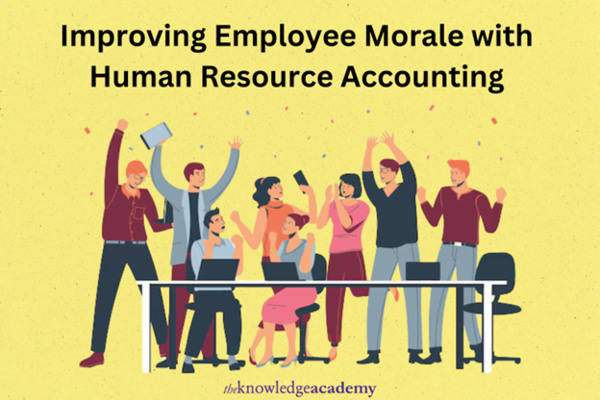Innovative Careers: Exploring the Challenges in Human Resource Accounting
Success in a business career depends on keeping high employee morale. Those with skills in Human Resource Accounting (HRA) are primed for companies seeking creative ways to achieve this. HRA involves measuring, analyzing, and reporting on an organization’s human resources to understand and optimize workforce value.
As businesses increasingly acknowledge the impact of human capital on their success, careers in HRA are growing in demand. Online instructor led HR Courses are available to help professionals analyse a job role and keep up with current trends, while understanding the basics of employment law regarding health and safety.
Organisations trying to raise employee satisfaction and productivity seek professionals that understand the Advantages and Disadvantages of Human Resource Accounting. Calculating human resources’ worth helps businesses establish a more open, fair, and motivating workplace.
Let’s look at how HRA might greatly improve staff morale and propel general organisational success.
Table of Contents
- Understanding Human Resource Accounting
- The Psychological Impact of Recognition
- Enhanced Employee Development
- Transparent Communication and Trust
- Improved Decision-Making and Fairness
- Aligning Individual and Organisational Goals
- Reducing Stress and Burnout
- Promoting a Culture of Ongoing Development
- Conclusion
Understanding Human Resource Accounting
We should first grasp what Human Resource Accounting is before looking at how it affects employee morale. HRA is an accounting technique that finds, quantifies, and documents organisational human resource value. Unlike conventional accounting, which emphasises tangible assets like buildings and machinery, HRA accords intangible assets — employees.
By putting a number on skills, knowledge, and experience, HRA gives a full picture of how much an organisation is really worth.
Individuals interested in a career in Human Resource Accounting should have strong analytical skills and a good understanding of both accounting principles and human resource management. A background in finance, accounting, or HR, combined with data analysis skills, is essential.
The Psychological Impact of Recognition
HRA raises employee morale mainly through appreciation. Employees feel valued and appreciated, knowing their contributions and abilities are being measured. This acknowledgement of their value transcends simple compliments or sporadic incentives; it is a formal acknowledgement.
Workers who value themselves are more likely to be driven, involved, and dedicated to their work. This appreciation helps to create a good workplace where staff members are eager to help the company grow.
If you’re seeking a role in Human Resource Accounting, being empathetic and having a strong sense of employee relations are important. You’ll need to understand how recognition and value measurement impact employee morale and contribute to a positive workplace culture.
Enhanced Employee Development
Human Resource Accounting can also significantly enhance employee development. By realising the worth of several abilities and talents, organisations can find areas where staff members shine and places where they require development. Training and development programmes can be more specifically tailored with this data-driven method.
Companies that invest in their employees’ growth and development have loyal workers who are satisfied with their positions. They believe the company values their career development, which raises job satisfaction and lowers turnover rates in turn.
Aspiring students in Human Resource Accounting should focus on personal development and continuous learning. Understanding talent management and development programs will be crucial. Courses in training and development, as well as HR analytics, can be highly beneficial.
Transparent Communication and Trust
Developing confidence inside a company depends mostly on transparency. HRA encourages openness by giving clear, unbiased information on employee value and success. Employee access to this data removes uncertainty and conjecture regarding the reception of their efforts.
Open communication helps build a culture of trust whereby staff members feel confident in their duties. Maintaining strong morale requires this confidence since it promotes honest communication, teamwork, and a feeling of togetherness.
For a career in Human Resource Accounting, excellent communication skills are vital. You should be able to convey complex data in a clear and understandable manner and foster transparency within the organization.
Improved Decision-Making and Fairness
Improved organisational decision-making is made possible by Human Resource Accounting. Managers who appreciate human resources will be more capable of deciding on promotions, pay scales, and resource distribution. This data-driven strategy guarantees that rather than subjective assessments, decisions are grounded on objective criteria.
These choices improve employee morale since they seem reasonable and fair. Maintaining a motivated and contented staff depends much on fairness in the workplace.
Those seeking careers in Human Resource Accounting should have a strong critical thinking mindset to seek solutions that align with an ethical foundation and a commitment to fairness and equity. Developing skills in strategic decision-making and understanding compensation and benefits structures will be beneficial.
Aligning Individual & Organisational Goals
HRA facilitates the alignment of particular employee goals with the company’s general goals. Understanding how their efforts affect the financial situation of the business helps people be driven to reach both personal and professional objectives.
Higher degrees of involvement and morale result from this alignment, which provides direction and purpose. Workers who believe their efforts are clearly making a difference develop feelings of accomplishment and pride.
Individuals interested in HRA should be adept at goal setting and performance management. Understanding how to align individual contributions with organizational objectives is key to success in this field.
Reducing Stress and Burnout
Burnout and workplace stress are major problems that could lower employee morale. Human Resource Accounting can help reduce these problems by better understanding workload distribution and employee well-being. Organisations can proactively handle issues by spotting overloaded staff members or those in danger of burnout. This can call for distributing work, lending extra help, or running wellness programmes. When workers believe that their health and happiness are valued, it makes them more motivated and productive.
Aspiring professionals in Human Resource Accounting should be knowledgeable about employee wellness and stress management techniques. Understanding how to analyze workload distribution and implement wellness initiatives can set you apart in this field.
Promoting a Culture of Ongoing Development
Through consistent evaluation and appreciation of human resources, HRA helps to create a culture of ongoing development. This continuous assessment motivates staff members to pursue chances for development and excellence.
Companies that give constant improvement top priority will be more suited to evolve with the times and stay competitive. Workers in such surroundings are more prone to be creative, proactive, and driven to help the business to flourish.
A career in Human Resource Accounting requires a commitment to fostering a culture of continuous improvement. Staying current with industry trends and being proactive in identifying opportunities for growth and development will help you succeed in this role.
Conclusion
HRA is important, but there are Limitations of Human Resource Accounting and many obstacles prevent it from being fully integrated and used in corporate initiatives. Still, HRA is a powerful tool that can make workers feel much better about their jobs. Organisations that value people as main assets will be able to build a good work atmosphere marked by justice, openness, development, and recognition.
HRA lowers stress, helps to match organisational and personal goals, and promotes an always improving culture. Using HRA can be a strategic step to improve employee morale and propel long-term success as companies negotiate the complexity of the contemporary workplace.






